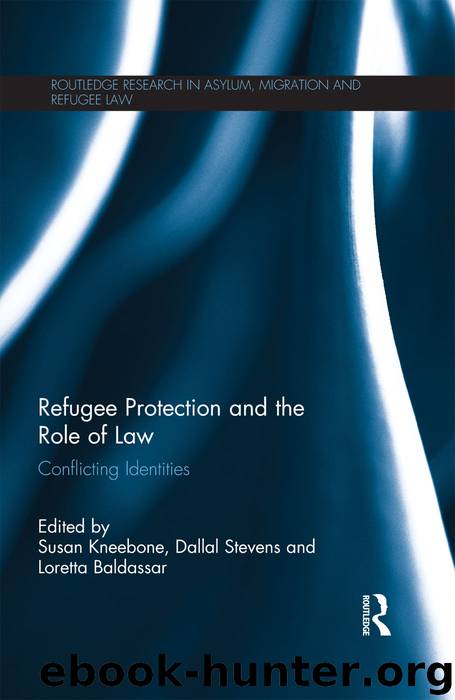Refugee Protection and the Role of Law by Unknown

Author:Unknown
Language: eng
Format: epub
ISBN: 978-1-135-04690-3
Publisher: Taylor and Francis
The problem of complex identities
Once asylum seekers are on the territory and have made an asylum application they are within the Eurodac system and so under surveillance in a very obvious way. But just to make sure that the asylum seeker does not seek to hide his or her ‘true’ identity, Article 31(8)(c) (formerly Article 23(4)(d)) of the Procedures Directive allows Member States to truncate the investigation of the claim to international protection because ‘the applicant has misled the authorities by presenting false information or documents or by withholding relevant information or documents with respect to his/her identity and/or nationality that could have had a negative impact on the [protection] decision’. State authorities will not tolerate complex identities. Asylum seekers are not like other people: they are obliged to inform the state about all aspects of their existence. Article 13(2) (formerly Article 11(2)) of the Procedures Directive sets out among the obligations on the asylum seeker to the state:
• A requirement to report to the competent authorities or to appear before them in person either without delay or at a specified time (specified by the state authorities);
• A requirement to hand over to the authorities documents in their possession relevant to the examination of the application, such as passports;
• A requirement to inform the competent authorities of their current place of residence or address and of any changes thereof as soon as possible. Member States may provide that the applicant shall have to accept any communication at the most recent place of residence or address which he/she indicated;
• A requirement to submit to searches by the competent authorities both of the person and of any items which the asylum seeker has with him/her;
• A requirement to submit to photographs;
• A requirement to submit to recording of oral statements (though the authorities must advise the asylum seeker that a recording is being made).
Asylum seekers are defined out of rights such as privacy, the obligation on the state that it has reasonable suspicion of the commission of a crime before interfering with the liberty of the person or imposing penalties. The state has claimed the right to carry out searches on asylum seekers bodies and property without the obligation to justify why or to have reasons for such searches. However, this EU framed exclusionary move may be countered by another supranational legal framework (European Convention on Human Rights) which at the same time prohibits it.62 The struggle is one between the capture of individuals into a population as a category and the supranational human rights legal system which entitles the individual to escape.
In order to move from being asylum seekers to refugees, individuals need to engage with the Member States’ administrations and to persuade them of the validity of their claims. While individuals have lives and stories full of contradictions, incoherence and detail, the claim to international protection must be accompanied by a single coherent, consistent story without deviations or messy edges which proves that the individual fulfils the definition of a
Download
This site does not store any files on its server. We only index and link to content provided by other sites. Please contact the content providers to delete copyright contents if any and email us, we'll remove relevant links or contents immediately.
Machine Learning at Scale with H2O by Gregory Keys | David Whiting(4313)
Killers of the Flower Moon by David Grann(4056)
Oathbringer (The Stormlight Archive, Book 3) by Brandon Sanderson(3217)
Will by Will Smith(2922)
Once Upon a Broken Heart by Stephanie Garber(2862)
Guns, Germs and Steel by Diamond Jared(2372)
It Starts With Us (It Ends with Us #2) by Colleen Hoover(2369)
Borders by unknow(2315)
Friends, Lovers, and the Big Terrible Thing by Matthew Perry(2231)
The Room Where It Happened by John Bolton;(2161)
The Color of Law by Richard Rothstein(1950)
A Short History of War by Jeremy Black(1849)
HBR's 10 Must Reads 2022 by Harvard Business Review(1846)
The Strength In Our Scars by Bianca Sparacino(1845)
A Game of Thrones (The Illustrated Edition) by George R. R. Martin(1750)
Water Rights and the Environment in the United States by John Burch(1687)
515945210 by Unknown(1668)
Examples & Explanations: Administrative Law by William F. Funk & Richard H. Seamon(1647)
That Every Man Be Armed by Stephen P. Halbrook(1583)
